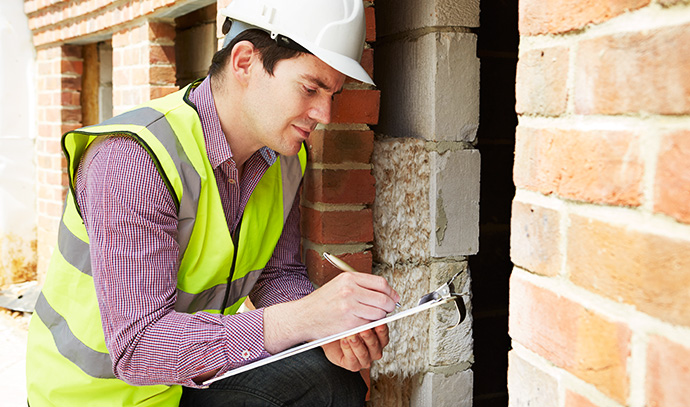happy-couple-sitting-front-house-under-construction
4 tips to making an offer on your first house
Anne Grobler, March
2017
Purchasing a property is one of the biggest investments most of us will ever make. It’s not surprising there is a certain amount of stress involved as you negotiate the process. However, a calm approach and some detailed research will ensure that you’ll be in your dream home before you know it.
[caption id="attachment_7244" align="alignnone" width="690"] The Contract of Sale, which is considered one of the most important documents involved in real estate transactions, can be prepared by a conveyancer, solicitor, or real estate agent.[/caption]
The Contract of Sale, which is considered one of the most important documents involved in real estate transactions, can be prepared by a conveyancer, solicitor, or real estate agent.[/caption]
 If you are genuinely interested in the property, give the agent enough information that they see you as a serious buyer, and will therefore keep you in the loop as things progress.[/caption]
If you are genuinely interested in the property, give the agent enough information that they see you as a serious buyer, and will therefore keep you in the loop as things progress.[/caption]
 A buyers’ agent experience can aid in the negotiation process, and OpenAgent is a great way to find one that is suitable for you.[/caption]
A buyers’ agent experience can aid in the negotiation process, and OpenAgent is a great way to find one that is suitable for you.[/caption]
 During the 'cooling off period', arrange inspections to ensure both the building's and any inclusions tally with those listed in the contract.[/caption]
During the 'cooling off period', arrange inspections to ensure both the building's and any inclusions tally with those listed in the contract.[/caption]
 The Contract of Sale, which is considered one of the most important documents involved in real estate transactions, can be prepared by a conveyancer, solicitor, or real estate agent.[/caption]
The Contract of Sale, which is considered one of the most important documents involved in real estate transactions, can be prepared by a conveyancer, solicitor, or real estate agent.[/caption]
The Contract of Sale
The person selling the property is required by law to prepare a Contract of Sale that is available to be inspected by potential purchasers. Included in this document should be a copy of the property’s title (from the NSW Land Titles Office or state equivalent), a local council issued zoning certificate, and copies of relevant paperwork pertaining to any other registered interests regarding the property. You are at liberty to ask to see this contract once you have viewed the property (at least once) and have expressed an interest with the seller or real estate agent. [caption id="attachment_4615" align="alignnone" width="690"] If you are genuinely interested in the property, give the agent enough information that they see you as a serious buyer, and will therefore keep you in the loop as things progress.[/caption]
If you are genuinely interested in the property, give the agent enough information that they see you as a serious buyer, and will therefore keep you in the loop as things progress.[/caption]
Time to Offer
Don’t make an offer before you have done some research about both the property and the area. Try and get an idea of the vendor’s expectations regarding the sale price, and then see what other comparable properties in the area have sold for recently. Don’t play your cards too close to your chest – if you are genuinely interested in the property, give the agent enough information that they see you as a serious buyer, and will therefore keep you in the loop as things progress. This is essentially the beginning of what could be a protracted period of negotiating, so try and get things off on the right foot. If the contract is acceptable to you and you feel ready to take the plunge, it’s time to make your offer. Whether this offer is verbal or written is process is state specific – so do check before you kick off the process. That being said, it is normally advisable to have a clear paper trail when purchasing property, so you may want to submit a written offer regardless. Your offer needs cover details such as the price you are willing to pay, any conditions you want to attach to the sale (such as required repairs), and the level of deposit and your preferred timeframe for moving in. Ask your conveyancer or solicitor to help you word the letter to ensure that all points are covered. [caption id="attachment_7242" align="alignleft" width="690"] A buyers’ agent experience can aid in the negotiation process, and OpenAgent is a great way to find one that is suitable for you.[/caption]
A buyers’ agent experience can aid in the negotiation process, and OpenAgent is a great way to find one that is suitable for you.[/caption]
Negotiate
If your first offer is accepted, all well and good. However, it is more commonplace to engage in some back and forth negotiations with the vendor before an offer is accepted. During this period, the vendor is at liberty to collect expressions of interest from other interested parties. If there are one or more other serious contenders for the property, the seller or real estate agent will probably ask you to make a higher offer or counter offer. A buyers’ agent experience can aid in the negotiation process, and OpenAgent is a great way to find one that is suitable for you. Once agreement has been reached, you may be required to pay a holding deposit to prove your interest is genuine. If you are unsuccessful, this deposit will be refunded to you. [caption id="attachment_7245" align="alignnone" width="690"] During the 'cooling off period', arrange inspections to ensure both the building's and any inclusions tally with those listed in the contract.[/caption]
During the 'cooling off period', arrange inspections to ensure both the building's and any inclusions tally with those listed in the contract.[/caption]



